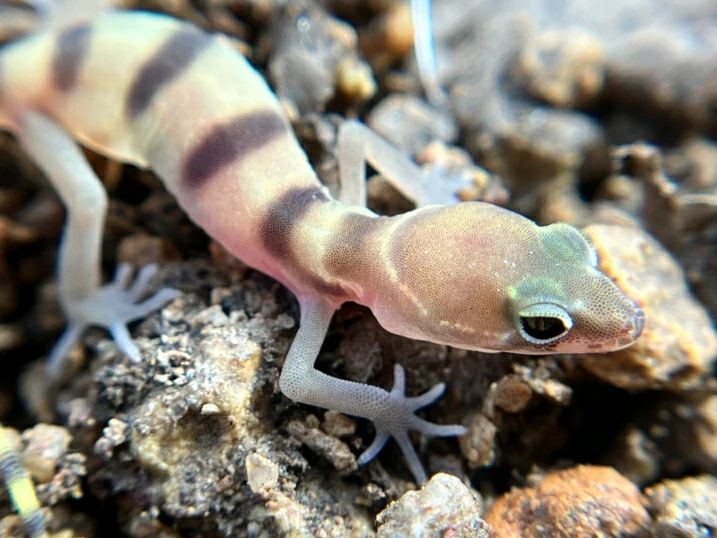You might have noticed it before, a gecko that always sat by your porch light suddenly gone. For weeks, it was there every evening, chasing insects drawn to the glow. Then, one night, nothing. No soft chirps, no flicking tail, no watchful eyes.
So what really happens? Why do geckos suddenly disappear?
Geckos disappear for a few reasons including: changes in weather, food, predators, or even shedding. Sometimes they move to find better spots. Other times, they hide to stay safe or rest.
It might look like they’ve vanished, but most of the time, they’re just nearby, waiting for things to settle.
Geckos Follow Warmth and Food
Most geckos are small animals that rely on outside heat to stay active. Their bodies can’t make warmth like ours. That means they’re always adjusting where they stay depending on temperature.

When nights get cooler, geckos often move to cracks in walls, under roofing sheets, or even inside houses, places that stay warmer.
Food matters too. Geckos don’t stick to one spot forever. If insects start disappearing because of weather or chemicals, the gecko will move to find better hunting spots.
So when you stop seeing your porch gecko, it might just be eating somewhere else.
Do Geckos Migrate Like Birds?
Not really, but they do move short distances when things change.
A gecko won’t fly across countries like a migrating bird, but it might travel several meters (even across neighboring yards) looking for warmth, safety, or food.
In tropical areas, geckos might stay outside during rainy months when insects are everywhere, then move indoors during the dry season when food is scarce.
So yes, in a small, personal way, geckos migrate too, just not in the big, seasonal way we usually think of.
Why Geckos Hide During the Day
If you’ve looked for your gecko in daylight, you probably won’t see it. Most geckos are nocturnal.
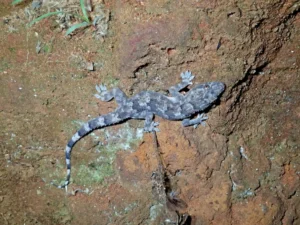
During the day, they find quiet, hidden spots (under bark, behind furniture, inside wall cracks) to rest and stay safe from predators.
Sometimes it looks like they’re gone, but really, they’re tucked away somewhere cool and dark, waiting for sunset. And when night comes, they’re back, silently hunting again.
When Geckos Disappear Because of Shedding
Shedding is one of the most overlooked reasons geckos vanish for a few days.
Before shedding, their color dulls and their skin loosens. They feel more vulnerable, so they hide until the old skin comes off.
You might not see them, but if you look later, you’ll often find bits of old skin on rocks or walls.
Once it’s done, they reappear, brighter and more alert. It’s a natural reset, not a disappearance.
Changes in Season Can Drive Geckos Away
Geckos are in tune with the rhythm of their environment. As temperatures and rainfall change, so does their behavior.
During cooler or drier months, they sometimes go into a light rest, not full hibernation, but slower and quieter.
They eat less, move less, and hide more. You might think they’re gone, but they’re just waiting it out. When warmth returns, they’re often back near their old favorite spots.
Predators Can Force Them Into Hiding
In many areas, geckos share space with snakes, cats, birds, and bigger lizards. These predators can make a gecko vanish overnight.
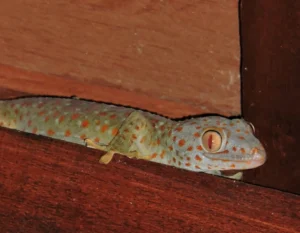
Even if they’re not eaten, the fear alone can make them move. One close call can send them to a new spot for good.
For example, if a bird hunts near your light, the gecko will probably relocate. They rely on silence and surprise to survive, so if a place feels unsafe, they’re gone.
Do Geckos Get Scared of Humans?
Yes, they do, even though they often live near people.
Most house geckos are shy. Sudden movements, bright lights, or loud noises can scare them away. If someone tries to catch or corner them, they’ll run and might not return for days.
Still, many geckos learn that homes mean insects and shelter. They’ll come back when it feels safe again. If your gecko vanished after you tried to photograph or move it, it’s probably nearby, just waiting for calm.
Environmental Changes That Make Geckos Leave
Even small changes can make geckos move.
-
Pesticides: Insect sprays remove their food and can harm them.
-
Renovations: New walls, lights, or sealed cracks take away hiding spots.
-
Lighting changes: Some geckos hunt near lights. Changing bulbs can affect where they hunt.
-
Temperature drops: Sudden cold fronts make them seek warmth indoors or underground.
These changes might seem small to us, but for a gecko, they can mean the difference between staying and leaving.
When Female Geckos Disappear to Lay Eggs
If your gecko is missing for several days in warmer months, she might be nesting.
Female geckos find hidden spots (under stones, bark, or loose soil) to lay eggs. After laying, they usually return to their normal routine.
If you see your gecko again a week later, calm and slimmer than before, she probably just finished laying eggs in peace.
The Secret Lives of Young Geckos
Young geckos are even more secretive than adults.
After hatching, they spend most of their time hiding and feeding on tiny insects. They’re easy prey, so they stay out of sight until they grow bigger and faster.
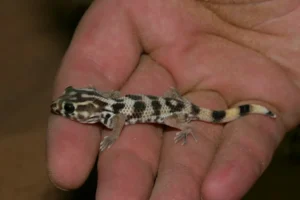
If you’ve been watching adult geckos and suddenly see none, it might mean the young are taking over, hidden in smaller cracks or behind new walls. It’s part of the quiet cycle that keeps their population steady, even when we can’t see it.
Do Geckos Ever Leave and Come Back?
Yes, often.
Geckos have strong homing instincts. If an area stays good, they tend to return after conditions improve.
For example, a gecko might leave your porch during a cold week, then reappear in the same corner once warmth comes back. It’s common to see the same individual in the same spot every night for months.
So if your gecko’s gone, don’t assume it’s gone forever. Sometimes they’re just taking a little break from the spotlight.
How Long Can Geckos Stay Hidden?
Depending on species and weather, geckos can stay hidden for days, weeks, or even months.
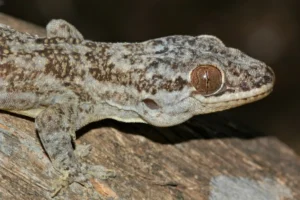
During cooler times, they enter a rest state, breathing slower, moving less, relying on stored energy.
They’ll stay tucked in walls or under bark, safe and slightly warm. You might never see them, but they’re still there, waiting for their world to warm up again.
Do Pet Geckos Disappear for the Same Reasons?
For pet owners, a gecko that vanishes in its enclosure can be worrying. But it’s usually normal.
Pet geckos hide when shedding, stressed, or adjusting to a new space.
For example:
-
A leopard gecko might burrow under its hide for several days before shedding.
-
A crested gecko might disappear into foliage when humidity changes.
In captivity, it’s their natural instinct, stay hidden, stay safe. As long as they’re eating and healthy when they reappear, there’s no need to worry.
When Disappearance Means Trouble
Not all disappearances are harmless.
If a gecko doesn’t return for a long time and there are new threats (outdoor cats, chemicals, or heavy cleaning) it might mean something went wrong.
Predators, injury, or toxins can sadly end a gecko’s life without leaving much trace.
Nature hides these moments quietly. That’s why it can seem like they vanish overnight.
Still, most of the time, disappearance is not death, it’s caution.
What You Can Do to Encourage Geckos to Return
If you want to see your geckos again, you can make your space inviting.
-
Keep a gentle outdoor light that attracts insects at night.
-
Avoid strong chemical sprays.
-
Leave a few quiet corners undisturbed.
-
Maintain a mild, warm environment if possible.
These small actions create safe, familiar spots that geckos recognize. When they feel secure, they’ll return, often to the exact same wall, branch, or light. They can be surprisingly faithful once they trust a space.
Conclusion
So why do geckos disappear?
They leave for warmth, food, safety, or rest, but they rarely vanish completely.
Most of the time, they’re just following nature’s rhythm: hiding, resting, shedding, or searching.
If you keep your space welcoming and gentle, they’ll likely find their way back.
In the quiet spaces of the night, geckos always return to where they once felt safe, even if we only notice when they’re gone.
Hi, my name is Ezra Mushala, i have been interested animals all my life. I am the main author and editor here at snakeinformer.com.

